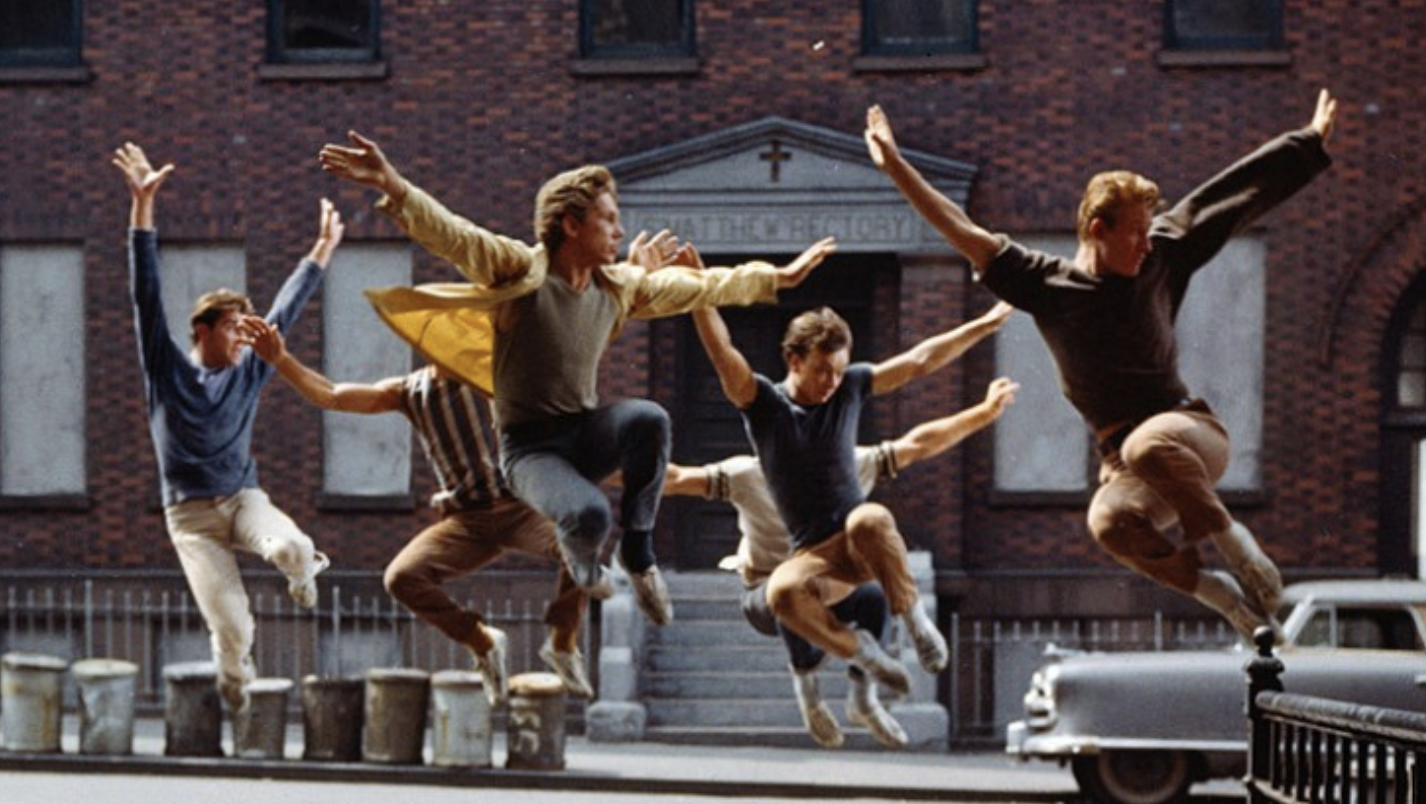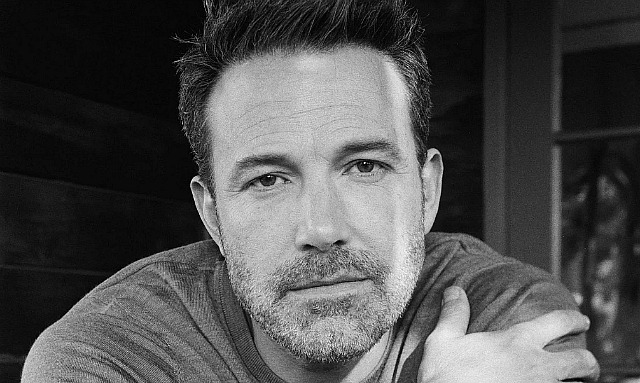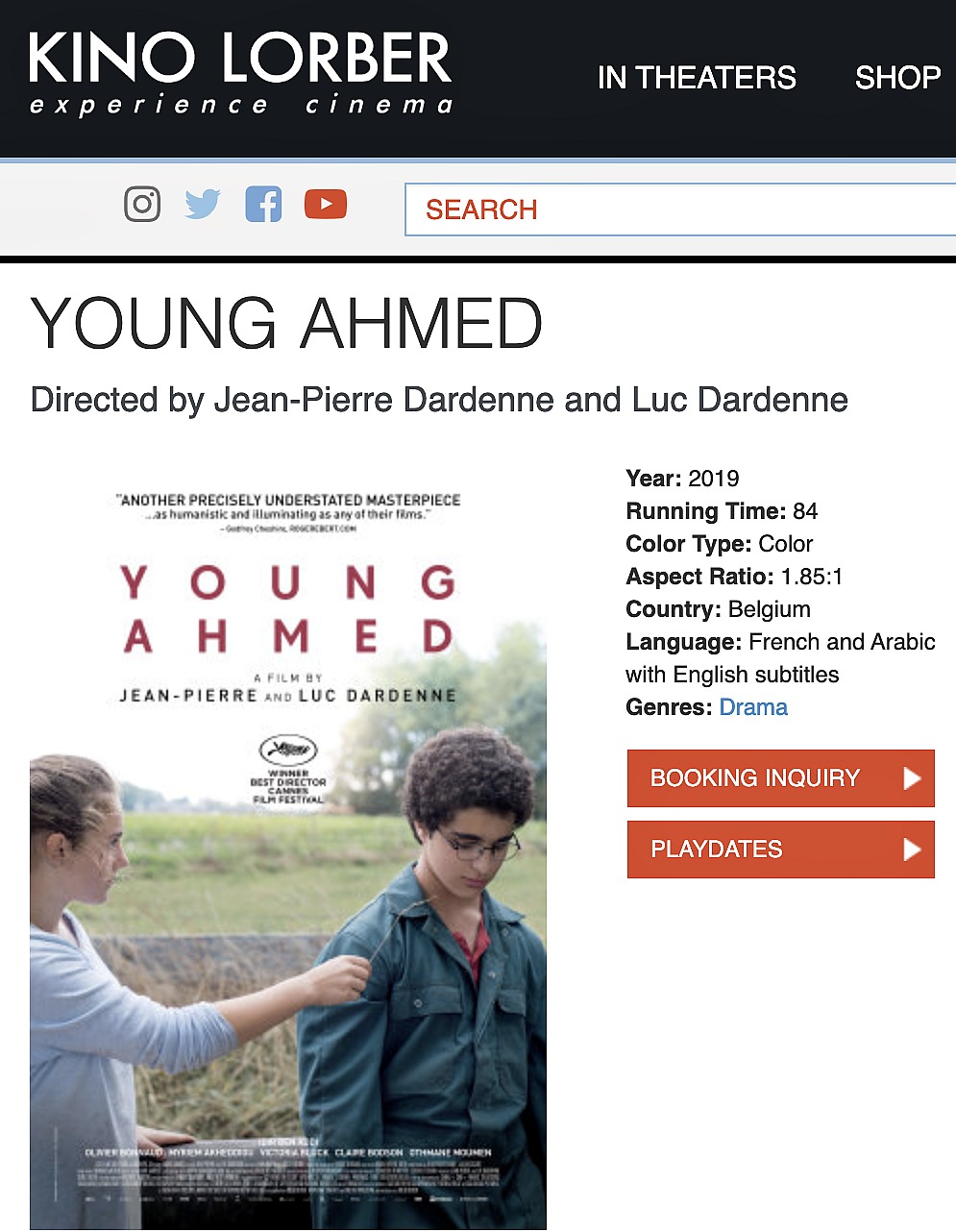Everyone knows what President Trump‘s decision to pardon eleven high-level bad guys (Rod Blagojevich, Michael Milken, Bernard Kerik Edward DeBartolo Jr., et. al.) is about. He’s obviously signalling everyone who might hurt him with damaging evidence or testimony that if they “dummy up” he’ll take care of them. Post-impeachment he’s free to foam at the mouth at will — nothing holding him back — all bets are off. What’s worse is that post-impeachment his approval ratings have gone up. No end to the downswirl. Worse and worse and worse. And then the final splintering and destruction of the Democratic party next summer when Bernie Sanders wins the nomination and takes the whole party over a cliff and we all go sliding into a Jeremy Corbyn-like sinkhole. Perfect!
Passable, No Issues
If you want to be liberal and comme ci comme ca, Ana de Armas vaguely resembles Marilyn Monroe. She doesn’t have that authentically damaged Midwestern milk-fed constitution that Monroe owned and radiated, but with the right kind of makeup and apparel and with platinum blonde hair, she’ll do. If you’re slender and beautiful it’s not that hard to slip into the Monroe aura. De Armas is certainly a better Norma Jean Baker fit than Gwen Stefani was for Jean Harlow in The Aviator, a casting choice that I found ridiculous. Michelle Williams is going to be tough to beat, of course, but every performance deserves to be taken on its own terms. The Cuban-born De Armas came along at the right time, is all. In today’s culture an Anglo Saxon actress playing a Latina wouldn’t be considered, of course, much less permitted, but the reverse is fine.

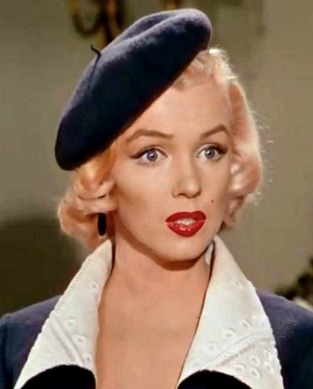
(l.) Ana de Armas as Marilyn Monroe in Andrew Domink’s Blonde; (r.) Monroe in 1953 or thereabouts.
Likely 2020 Best Picture Contenders
There are ten upcoming 2020 releases that smell like possible Best Picture material. To me anyway. David Fincher‘s Mank, Aaron Sorkin‘s Trial of the Chicago 7, Ridley Scott‘s The Last Duel, Tom McCarthy’s Stillwater, Steven Spielberg‘s West Side Story, Joel Coen‘s Macbeth, Andrew Dominik‘s Blonde, Leos Carax’s Annette, Paul Greengrass’s News of the World and Terrence Malick‘s The Last Planet. (10)
I know that Carax’s film…actually I know nothing except it’s a musical and Carax is crazy in a good way. I’m sensing that post-Parasite things suddenly feel a lot less constrained as far as Best Picture criteria are concerned. I know that Malick doesn’t do Oscar-aspiring films, but Planet is some kind of Jesus of Nazareth saga. (Almost certainly not geared for the Mel Gibson crowd.) I have a 12-year-old draft of Sorkin’s film — just received it today. I’ve read Mank, but I’d also love to read Blonde, Stillwater and News of the World.

Ana de Armas in Andrew Dominik‘s Blonde.
The somewhat-less-likelies include Chris Nolan‘s Tenet, Charlie Kaufman’s I’m Thinking Of Ending Things, Wes Anderson’s The French Dispatch, Guillermo del Toro’s Nightmare Alley, Sofia Coppola’s On the Rocks, Denis Villenueve’s Dune, Spike Lee’s Da 5 Bloods, Edgar Wright’s Last Night In Soho, Steven Soderbergh’s Let Them All Talk, Adrian Lyne’s Deep Water and Liesl Tommy‘s Respect. (11)
Not to mention Paul Verhoeven’s Benedetta, Apichatpong Weerasethakul’s Memoria, Chloe Zhao’s Nomadland and Mia Hansen-Løve’s Bergman Island. (4)
That’s 25 head-turners for starters. What am I missing, cream of the crop-wise?
Slimmer, Stubble, No Boozing
Earlier this month I repeated a matter of common industry knowledge about Ben Affleck and Gavin O’Connor‘s The Way Back (Warner Bros., 3.6). Affleck has been famously struggling with alcohol issues for years, and so (in the realm of the film) is “Jack Cunningham”, a former basketball star who bends the elbow. The film is therefore self-portraiture to some extent.
Today a N.Y. Times profile of Affleck, written by Brooks Barnes, acknowledges the obvious and offers Affleck a forum by which to admit his past sins and express regrets.
The photos reveal that Affleck is no longer the “fat bearded boozer” he plays in O’Connor’s film. He’s sober (for now), shaven and relatively slender. Then again, as Barnes’ piece reports, Affleck has had three stints in rehab (in ’01, ’17 and ’18) and then he relapsed last fall.
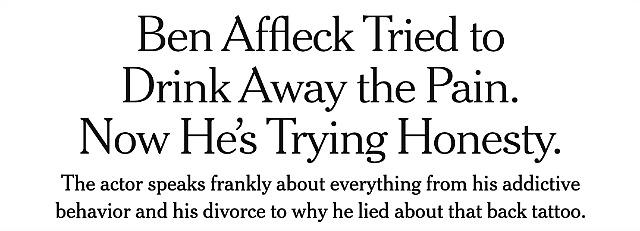
Affleck admission #1: “I drank relatively normally for a long time. What happened was that I started drinking more and more when my marriage was falling apart. This was 2015, 2016. My drinking, of course, created more marital problems.
Affleck admission #2: “It’s not particularly healthy for me to obsess over the failures — the relapses — and beat myself up. I have certainly made mistakes. I have certainly done things that I regret. But you’ve got to pick yourself up, learn from it, learn some more, try to move forward.”
Affleck admission #3: “People with compulsive behavior, and I am one, have this kind of basic discomfort all the time…[they’re] trying to make yourself feel better with eating or drinking or sex or gambling or shopping or whatever. But that ends up making your life worse. Then you do more of it to make that discomfort go away. Then the real pain starts. It becomes a vicious cycle you can’t break. That’s at least what happened to me.”
Affleck admission #4: “Relapse is embarrassing, obviously. I wish it didn’t happen. I really wish it wasn’t on the internet for my kids to see. Jen and I did our best to address it and be honest.”
The Way Back opens two and a half weeks hence, but nobody I know has seen it.
Note: If I’m not mistaken the N.Y. Times used to capitalize the “i” in internet – no longer.
Whose Radical Left Agenda?
From “Pete Buttigieg is more electable than Bernie Sanders — and more progressive than you think,” posted by Vox‘s Dylan Matthews on 2.4.20:
“The Democratic Party wins when it nominates young, charismatic leaders who are able to convince people outside the party’s base that Democratic values are their own. It is a model that drove Barack Obama, Bill Clinton, Jimmy Carter and John F. Kennedy to the presidency. And it could be the model that puts Pete Buttigieg there.
“As the former mayor of South Bend, Indiana, he’s not the most experienced candidate running. And while he would probably be the most left-wing nominee since at least Walter Mondale, he is hardly the leftmost candidate in this primary, and he’s worked hard to differentiate himself from the maximalist platforms of Senators Bernie Sanders and Elizabeth Warren.”
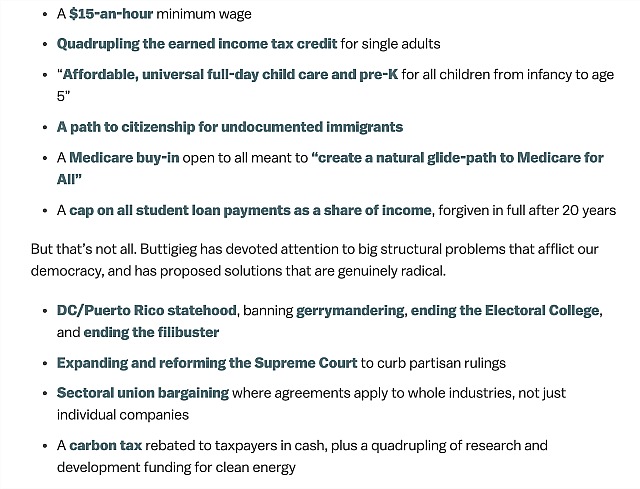
Adventures of Buck, The Wonder Dog
Somewhere in heaven the ghost of Jack London is repeatedly slamming his fist into a refrigerator and screaming “you worthless motherfuckers…I want to come down to earth, surreptitiously occupy the body of somebody like Dwayne Johnson and pound your worthless asses into mush!”
The recipients would be those principally responsible for The Call of the Wild (20th Century Studios, 2.21) — director Chris Sanders, producer Erwin Stoff, screenwriter Michael Green and costar Harrison Ford, who plays Alaskan lonely guy and struggling alcoholic John Thornton (whom Clark Gable portrayed in William Wellman’s 1935 version).
If we lived in a fair and just universe London’s wish would be granted by the same heavenly manager who allowed Billy Bigelow to return to earth in order to help his unhappy daughter. For The Call of the Wild is swill — a live-action CG cartoon aimed at idiots, kids, families and simpletons of all ages.
Does anyone remember Jean Jacques Annaud‘s The Bear (’88)? A naturalistic coming-of-age survival saga starring real bears and two or three supporting humans? It too was aimed at the family trade and but didn’t pander or dumb itself down. By any yardstick The Bear was intelligent, moving, believable, rewarding. And all the animals were real! I loved it when I caught an all-media screening 32 years ago, and I’m actually planning on seeing it again this week. Mainly because a good film is a good film and it’s been too long. But also because The Bear was everything that The Call of The Wild isn’t, and I want to flush the latter out of my system.
God, I hate movies about animals with great big hearts and loads of loyalty and courage, but at the same time don’t respect the natural way of things…films that insist on serving fast food and snow cones instead of wholesome Greek yogurt and steamed green beans or, you know, stuff worth eating.
This is a family flick with, I’ll admit, a fair amount of synthetic warmth and personality, and I realize that it might “get” some people if their standards are low enough. But it’s almost entirely about fake bullshit, fake bullshit and — just to break up the monotony — fake bullshit. It’s primitive candy corn — a confection that worships trite formulaic contrivances, and in fact smears them all over your face like street mud. Another way of putting it is that The Call of the Wild that has so little respect for you, the viewer, and is so determined to treat you like a Disneyland-attending moron that it knocks you down like a big playful dog, raises its hind leg and pisses right into your face.
I hate movies like this, I hate the generic family-flick mindset and I hate Sanders, who’s known for co-writing and directing Disney’s Lilo & Stitch (’02) and DreamWorks’ How to Train Your Dragon (’10).
Does “Young Ahmed” Even Exist?
I saw Jean-Pierre and Luc Dardenne‘s Young Ahmed (Kino Lorber, 2.21 in NYC, 3.6 in LA) during last May’s Cannes Film Festival. I called it an “an 84-minute waiting-game movie about a young Islamic psychopath and would-be Jihadist (Idir Ben Addi) planning to murder his female teacher (Myriem Akheddiou) out of blind adherence to Islamic derangement syndrome.”
There’s only one reason to introduce a character with strong Islamic beliefs — i.e., to start the clock ticking on whether or not this character will commit some act of ghastly terror. This is precisely what the Dardennes have done with Young Ahmed, which should probably be re-titled Young Islamic Asshole and subtitled Just For Laughs, How About Killing Yourself Without Taking Any Innocent Victims With You?
Which is why it’s a “waiting game” film because all you can think about is “when or who is this kid going to kill, or will somebody kill him before he strikes?”
Except Young Ahmed ends rather profoundly. The last couple of minutes are so good, in fact, that I wound up forgiving the first 80 or so. I should also say that it ends more compassionately than would be warranted in real life.
Kino Lorber is distributing Young Ahmed with an absolute minimum of fanfare. No screenings have been scheduled, or at least none that anyone knows of. At least one major critic hasn’t even been sent a streaming link, which suggests that links are scarce all around. This morning I asked Kino’s David Ninh if he was sending links to critics — he passed the request along to Ryan Werner.
Why so little effort for a film that won the 2019 Cannes Film Festival’s Best Director award, and which almost won the Palme d’Or (at least according to World of Reel‘s Jordan Ruimy, who reported on 5.18 that a trusted Cannes source had told him that Young Ahmed might well have been handed the grand prize if Parasite hadn’t come along)?
One presumes that Kino Lorber simply can’t afford the promotional expense. There’s also the fact that outside of the loyal cineastes who frequent The Quad and West L.A.’s Royal, “almost won the Palme d’Or” doesn’t cut much ice. Even films that have actually won the Palme d’Or aren’t paid that much attention to.
I respected Young Ahmed and, as always, found myself admiring the pared-down, unfancified style of the Dardennes. Then again the 53% Rotten Tomatoes score isn’t exactly a rousing number. Husband: “Hey, what about this flick about a young Islamic lunatic who wants to knife his teacher to death because her existence is an affront to Allah and the Koran?” Wife: “Maybe not.”
Subject-wise most human beings on the planet earth aren’t exactly inclined to feel compassion for a young homicidal monster. I don’t like admitting to myself that teenage Islamic fanatics who would murder their teachers need to be imprisoned or better yet exterminated like termites, but it’s how I basically feel.
Either way it’s odd to contemplate the enormous gulf between the Cannes aura that a certain film could generate (i.e., major aesthetic import, thundering cinematic importance) and an all but complete lack of interest when such a film (especially when directed by the dutiful, highly efficient but overly low-key Dardennes brothers) opens stateside.
Not a bird will stir in the trees of Manhattan when this film opens four days hence; ditto the trees of West L.A. next month.
Halo Effect
Has anyone seen Jeff Nichols‘ Midnight Special, which opened a little less than four years ago? Of those who saw it, does anyone remember much about it? You wouldn’t be expected to as it was fairly negligible. (A good 20% if not 30% of the RT positive notices were born of knee-jerk critical deference to Nichols, who’s one of the good guys whom everyone is required to like.) And it was a commercial bust, costing $18 million but earning only $6.7 million.
I called it “a grim, grubby paranoid road-chase thing — a kind of shitkicker film about peeling rubber and hiding out in shitty motels and dodging the authorities, mixed in with doses of Starman, E.T. and Close Encounters. For my money it felt like too much work for too little payoff. When it ended I was muttering to myself, ‘That’s it?’ As I was driving back over the hill I was saying to myself, ‘You can’t hit a homer every time at bat.'”
Until last night I had no reasonable expectation of ever thinking about Midnight Special again. But then, out of the blue, Tomato-approved critic Monica Castillo tweeted that Nichols’ film was “still great.” To which I responded, “Uhm, why would you call it ‘great’? It obviously isn’t.” Castillo replied, “Because I thought it was great. We can agree to disagree on this movie and many others.” What could anyone say to that except “okay, I guess, whatever”?
But within seconds TheWrap‘s Alonso Duralde pounced on me for mansplaining and sounding like an asshat. Not for disagreeing with Castillo’s opinion but for disagreeing with Castillo. Because on Twitter, the gentlemanly thing is to never sharply disagree with a Latina critic, and to in fact treat all gilded-cage critics with kid gloves. Which of course is a form of chivalrous chauvinism and protective paternalism.
If I’d disagreed with, say, Emiliano Castillo of the San Jose Mercury News, Duralde wouldn’t have said boo and he knows it.
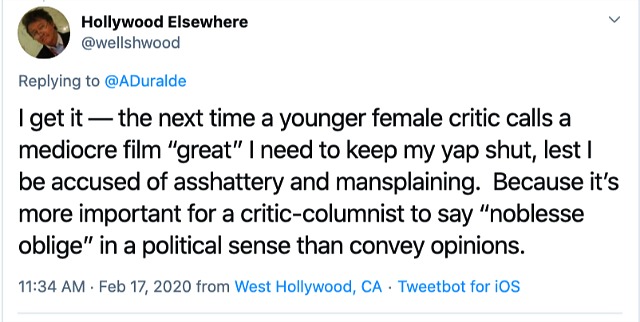
div>
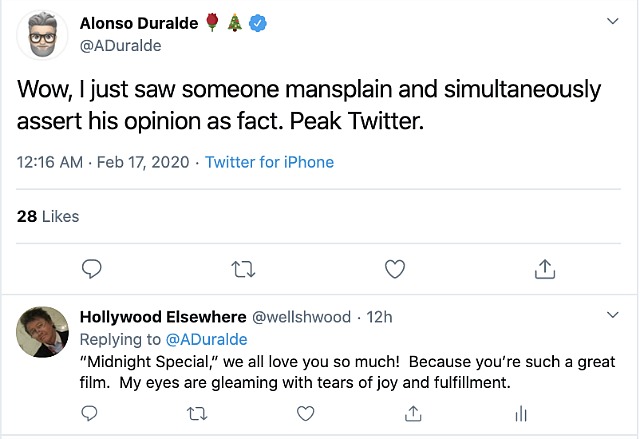
div>
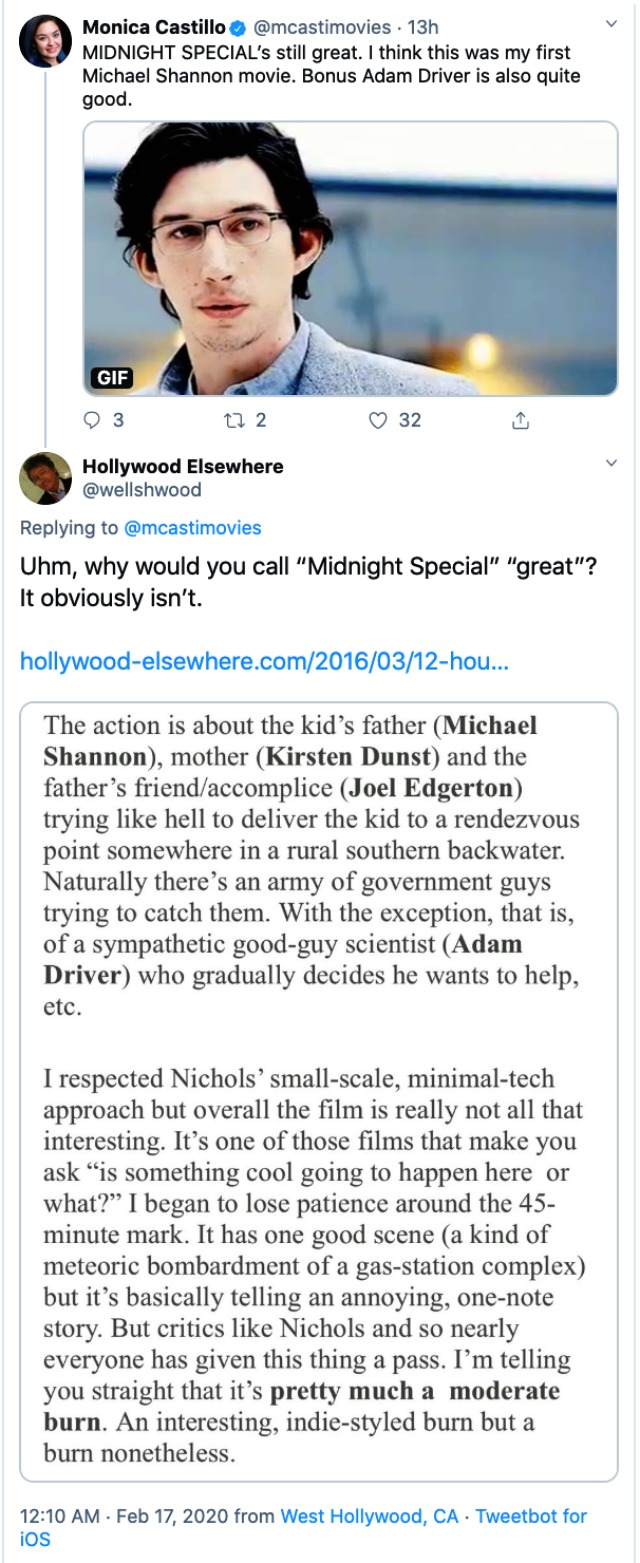
div>
Eve of Self-Destruction
Critic pally: “I’m increasingly excited by the prospect of a Mike Bloomberg candidacy. Because my basic view is that I don’t think any of the others can win. Like, I think they have zero fucking chance. Your writing on Bernie Sanders has been spot-on — I agree with every word. And Typewriter Joe…forget about it. He seems ready for assisted living, and I’m so glad he now appears to be going down in flames. Who does that leave? It leaves BB.”


“Responsible For The Quality”?
What’s the explanation, then, for the latest “product”? You know, the “big CG dog in Alaska” one? Which I can’t review until tomorrow.
People Are No Damn Good, Part 2
Fantasy Island was, is and always will be rank Blumhouse garbage with a 9% Rotten Tomatoes rating. And yet this weekend it’s making almost three times as much as Downhill, which also had a RT failing grade (40%). Good God, even the dead-and-buried Dolittle made more than Downhill. And as I’ve said two or three times so far, Downhill isn’t half bad.
This isn’t about the movies — it’s about the unfortunate dominance of moronic, zero-taste moviegoers.
I guess in hindsight it wasn’t such a good idea to cast Will Ferrell as the cowardly run-for-cover dad. Your basic popcorn idiot wants to laugh when he/she pays to see a Ferrell film, and audiences could tell from the trailer that this wasn’t his usual-usual. I guess nobody wanted to see a dramedy about marital discord and guilt-tripping on a St. Valentine’s Day weekend. Or…wait, perhaps Joe and Jane Popcorn decided that they agreed with the Hollywood Elsewhere view that the real fault lay with Julia Louis Dreyfus and their two inert pudgeball sons, because they just sat there as an avalanche approached?
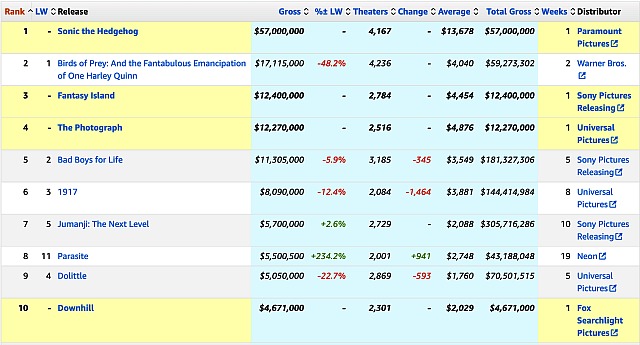
“Goldfish Would Commit Suicide…”
No semi-civilized person has ever served tap water to guests (particularly well-heeled Los Angeles guests) at a dinner table. Ever. But if they did happen to do this…well, I wouldn’t react the way Larry David does in this clip. After tasting it, I would simply return the nearly-filled glass of tap water to its proper position and innocently ask my host if he/she happens to have…oh, a Diet Coke or Ginger Ale or something in that realm. That’s why this bit doesn’t quite work. Because the Elizabeth Perkins character isn’t based upon reality.
And anyone who equates the throwing of a softball or the swinging of a tennis racket to stabbing a dummy with a carving knife isn’t eccentric or whimsical or loopy — that person would be psychotic.


